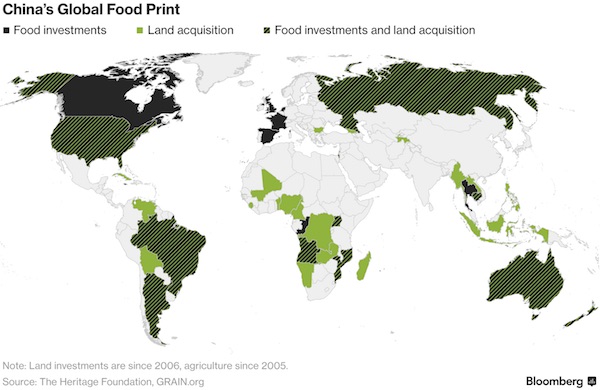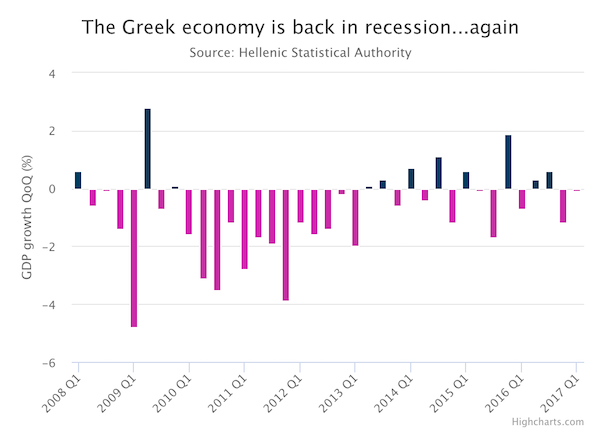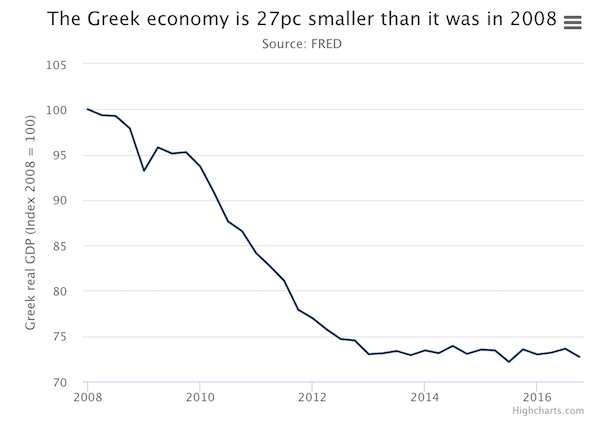
Springenberg Luther nails his theses to the church door

And released it all anyway. Still not besties with US Intelligence.
• Trump Frustrated By Secrecy With JFK Files (AP)
Just before the release Thursday, Trump wrote in a memorandum that he had “no choice” but to agree to requests from the CIA and FBI to keep thousands of documents secret because of the possibility that releasing the information could still harm national security. Two aides said Trump was upset by what he perceived to be overly broad secrecy requests, adding that the agencies had been explicitly warned about his expectation that redactions be kept to a minimum. “The president and White House have been very clear with all agencies for weeks: They must be transparent and disclose all information possible,” White House Principal Deputy Press Secretary Raj Shah said Friday.
Late last week, Trump received his first official briefing on the release in an Oval Office meeting that included Chief of Staff John Kelly, White House Counsel Don McGahn and National Security Council legal adviser John Eisenberg. Trump made it clear he was unsatisfied with the pace of declassification. Trump’s tweets, an official said, were meant as a signal to the intelligence community to take seriously his threats to release the documents in their entirety. According to White House officials, Trump accepted that some of the records contained references to sensitive sources and methods used by the intelligence community and law enforcement and that declassification could harm American foreign policy interests. But after having the scope of the redactions presented to him, Trump told aides he did not believe them to be in the spirit of the law.
On Thursday, Trump’s top aides presented him with an alternative to simply acquiescing to the agency requests: He could temporarily allow the redactions while ordering the agencies to launch a new comprehensive examination of the records still withheld or redacted in part. Trump accepted the suggestion, ordering that agencies be “extremely circumspect” about keeping the remaining documents secret at the end of the 180-day assessment. “After strict consultation with General Kelly, the CIA and other agencies, I will be releasing ALL JFK files other than the names and addresses of any mentioned person who is still living,” Trump wrote in a Friday tweet. “I am doing this for reasons of full disclosure, transparency and in order to put any and all conspiracy theories to rest.”

Is the swamp being drained?
• Battle Hymns of the Republicans (G.)
The November election did not put an end to the Republican Party’s civil war – a chasm between the establishment in Washington and grassroots activists that deepened with the rise of the Tea Party movement of 2009. Trump has only amplified it. Flake, after all, was not alone in his scathing criticism of the president. All week, a feud between Trump and Bob Corker, the Republican chair of the Senate foreign relations committee, soared to new heights – or depths. It culminated in Corker issuing his own stunning rebuke of Trump. “When his term is over, the constant non-truth-telling, the name-calling, the debasement of our nation, will be what he will be remembered most for,” Corker told CNN. Corker announced his own retirement last month, joining the ranks of a small but growing number of Republicans who have come to see Trump’s presidency as a moment of reckoning.
On one side is Trump, the most unpopular president in modern US history, ushered in by a grassroots movement with Steve Bannon, the former White House chief strategist, at its helm. On the other is the old guard of Republican leaders, struggling to distance themselves from Trump’s toxicity and a party base that he increasingly drives with racially motivated nationalism. Critics like Flake, Corker and McCain subscribe to the views espoused by Republican presidents back to Ronald Reagan – a belief in limited government, moderate positions on immigration and trade – but Bannonites have waged war on “globalists” and used race and class to drive a wedge between the establishment and a rancorous base unmoored by the economic and cultural dislocation of the last 20 years.
The friction has prompted a battle for the soul of the Republican party. A strategist aligned with Bannon told the Guardian that Trump’s victory unleashed an insurgent movement that wants to overthrow the party establishment in Washington. “The strategy is to make everyone look over their shoulders,” the Bannon ally said, “so they understand that they are no longer in charge of the Republican party.” As reports of Flake’s retirement surfaced, another ally of Bannon swiftly celebrated the news by claiming “another scalp”. The departure of another moderate senator – at least, a moderate within the current Republican party – was the latest victory in Bannon’s mission to reshape the conservative movement.

White House leaks say Powell will be next Fed head. Rickards expects Kevin Warsh. But yeah, Trump will be in Asia after November 3. What effect does that have on the Mueller thingy?
• Markets Await Trump’s Decision on Fed Chair (Rickards)
President Trump is expected to nominate the next Federal Reserve chair within a matter of days. As I’ve explained before, Donald Trump has the opportunity to appoint a higher percentage of the Board of Governors of the Federal Reserve system at one time than any president since Woodrow Wilson. President Wilson signed the Federal Reserve Act during the creation of the Fed in 1913 when they had a vacant board. At that time, the law said the secretary of the Treasury and the comptroller of the currency were automatically on the Fed’s board of governors. But besides that, President Wilson selected all of the other participating members. Due to vacancies he inherited and key resignations, Trump now has the opportunity to fill more seats on the Fed’s Board of Governors than any president since then. That’s pretty amazing when you think about it.
To review, the Federal Reserve’s Board of Governors is made up of seven appointees. That means that they can make a majority decision with four votes. If you’re reading about the Fed, you might also see reference to “regional reserve bank presidents.” These are roles within the Federal Reserve System, but the real power is found on seven-member Board of Governors. Trump will own the Fed. Meaning, whatever the president wants monetary policy to be, he’ll get. In other words, Donald Trump will be able to shape the Fed’s majority. But the tricky part is figuring out how he plans to shape it… During the campaign season, Trump called China and other nations currency manipulators. That signaled he believed the dollar was too strong and wanted it to weaken. But then the North Korean nuclear crisis rose to the fore.
Trump backed off his threats against China because China has the most economic influence over North Korea, and Trump wanted China to use that leverage to convince the North to back off its nuclear program. But China didn’t deliver as Trump had hoped, and a trade war with China is now likely. That’s especially true now. Chinese president Xi Jinping has solidified his hold on power after the Chinese Politburo re-appointed him yesterday. Xi had avoided rocking the boat in recent months while his position was uncertain. But now that his lock on power is secure, Xi can afford to be much more confrontational with Trump. Trump’s trade policy has led many to believe that Trump will appoint a lot of “doves” to the Board. But don’t be surprised if Trump goes with a hard-money board. In fact, that’s what I expect. These will be hard-money, strong-dollar people, contrary to a lot of expectations.

The Fed’s credibility. And Mueller’s. And Comey’s.
• The Informant Cometh (Jim Kunstler)
Now, it also happens that the deal for Tenex to buy Uranium One had to be approved by nine federal agencies and signed off on by Secretary of State Hillary Clinton, which she did shortly after her husband Bill Clinton was paid $500,000 to give a speech in Moscow sponsored by a Russian bank. The Clinton Foundation also received millions of dollars in “charitable” donations from parties with an interest in the Tenex / Uranium One deal. It happened, too, that the CEO of Uranium One at the time of the Tenex sale, Frank Guistra, was one of eleven board members of the Clinton Foundation. The informant remained undercover for the FBI for five years. None of the Clinton involvement was included in the previously mentioned federal bribery and racketeering prosecutions.
Meanwhile, the informant had signed a nondisclosure agreement with the Obama Justice Department, only just lifted last week. As of this morning, the story is absent from The New York Times, formerly the nation’s newspaper of record. The FBI’s credibility is at stake in this case. Robert Mueller, who was Director of the agency during the Tenex/Uranium One deal, with all its Clintonian-Russian undertones, is in the peculiar position now as special prosecutor for the Russian election “meddling” alleged to involve President Trump. Whatever that investigation has turned up is not known publicly yet, but the massive leaking from government employees that turned the story into roughly 80% of mainstream legacy news coverage the past year, has ceased — either because Mueller has imposed Draconian restraints on his own staff, or because there is nothing there.
The FBI has a lot to answer for in overlooking the Clinton connection to the Uranium One deal. The informant, soon to be attached to a name and a face, is coming in from the cold, to the warm, wainscoted chambers of the house and senate committees. I wonder if Mr. Trump, or his lawyers, will find grounds to attempt to dismiss Special Prosecutor Mueller, given what looks like Mueller’s compromised position vis-à-vis Trump’s election opponent, HRC. It’s hard to not see this thing going a long way — at the same time that financial markets and geopolitical matters are heading south. Keep your hats on.

Once people start thinkng they’re actually going to do this, the effects will be felt way before 2019.
• In 2019, Central Bank Liquidity Finally Turns Negative (ZH)
[..] the great Central Bank liquidity tide, which generated over $2 trillion in central bank purchasing power in 2017 alone – and which as Bank of America said last month is the only reason why stocks are at record highs, is now on its way out. This was a point first made by Deutsche Bank’s Alan Ruskin two weeks ago, who looked at the collapse in global vol, and concluded that “as we look at what could shake the panoply of low vol forces, it is the thaw in Central Bank policy as they retreat from emergency measures that is potentially most intriguing/worrying.
We are likely to be nearing a low point for major market bond and equity vol, and if the catalyst is policy it will likely come from positive volatility QE ‘flow effect’ being more powerful than the vol depressant ‘stock effect’. To twist a phrase from another well know Chicago economist: Vol may not always and everywhere be a monetary phenomena – but this is the first place to look for economic catalysts over the coming year.” He showed this great receding tide of liquidity in the following chart projecting central bank “flows” over the next two years, and which showed that “by the end of next year, the combined expansion of all the major Central Bank balance sheets will have collapsed from a 12 month growth rate of $2 trillion per annum to zero.”
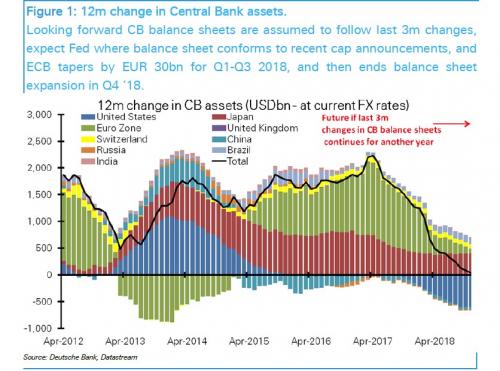
Shortly after, Fasanara Capital’s Francesco Filia used this core observation in his own bearish forecast, when he wrote that “the undoing of loose monetary policies (NIRP, ZIRP), and the transitioning from ‘Peak Quantitative Easing’ to Quantitative Tightening, will create a liquidity withdrawal of over $1 trillion in 2018 alone. The reaction of the passive community will determine the speed of the adjustment in the pricing for both safe and risk assets.”
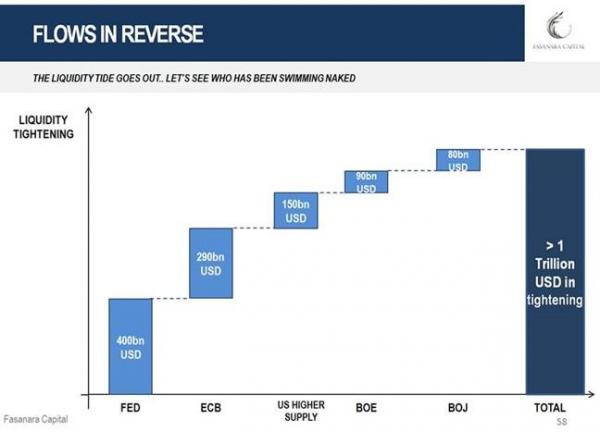
Fast forward to today, when Bank of America’s Barnaby Martin is the latest analyst to pick up on this theme of great liquidity withdrawal. Looking at (and past) the ECB’s announcement, Martin writes that “as expected, Mario Draghi took a knife to the ECB’s quantitative easing programme yesterday. From January 2018, monthly asset purchases will decline from €60bn to €30bn, and continue for another 9m (and remain open ended). The ECB now joins an array of central banks across the globe that are either shrinking their balance sheets or heavily scaling back bond buying.” [..] However, as Ruskin and Filia warn, Martin underscores that it is the bigger point that is ignored by markets, namely that it is all about the “flow” of central bank purchases.
And in this context, the BofA strategist warns that it will take just over a year before the global liquidity tide not only reaches zero, but turns negative… some time in early 2019. Chart 1 shows year-over-year changes in global asset purchases by central banks (we also include China FX reserves here). Given this year’s slowdown in ECB and BoJ QE (the latter, in particular, is striking in USD terms), we are well past the peak in global asset buying by central banks. But with the Fed now embarking on balance sheet shrinkage, the start of 2019 should mark the point where year-over-year asset purchases finally turn negative – a trend change that will come after four straight years of expansion.
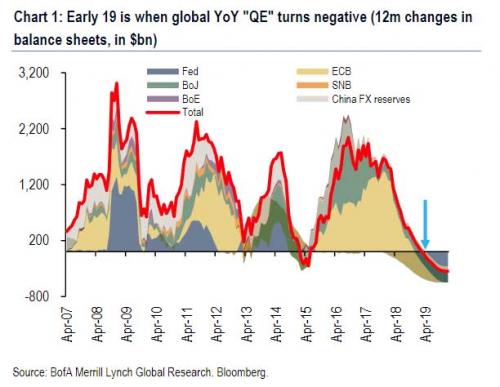

Government and banks want one thing: keep housing prices high.
• All Hail British Banks: Self-absorbed, Short-termist And Spivvy (G.)
It’s not only the government that is obsessed with lending to prop up property owners and developers – the banking sector is keen, too. The report sets out the way UK banks mostly lend abroad, with loans to UK businesses accounting for just 5% of total UK bank assets, compared with 11% in France, 12% in Germany and 14% on average across the rest of the eurozone. Property loans to businesses and individuals in the UK account for more than 78% of all loans to individuals and non-financial businesses – which means those outside the Square Mile. After stripping out real estate, loans to UK businesses account for just 3% of all banking assets. As a transmission mechanism for diverting the nation’s savings into worthwhile, productive businesses, the banks fail miserably. And the rest of the financial sector is just as bad.
The IPPR report accused hedge funds, proprietary traders (which use investment bank cash) and high-frequency traders – a group that collectively makes up 72% of trades in on the London market – of paying themselves depending on performance against rivals and over short timescales, “not long-term value creation”. This spivvy trading arena has the knock-on effect of making short-term demands on the boards of listed companies. Such is the pressure to avoid being caught in traders’ headlights that in a survey of more than 400 executives, some 75% said they “would sacrifice positive economic outcomes” if it helped smooth their profit figures from one quarter to the next. The report argues that this self-absorbed world of stock market trading needs to support longer-term investment in a way that also benefits savers and business owners.

At least for now it’s peaceful. But Puidgemont seems to have weakened.
• Sacked Catalonia Leader Calls For Opposition To Madrid’s Rule (R.)
Sacked Catalonian president Carles Puigdemont on Saturday called for peaceful “democratic opposition” to the central government’s takeover of the region following its unilateral declaration of independence from Spain. Puigdemont, whose regional government was dismissed by Spanish Prime Minister Mariano Rajoy on Friday, accused Madrid of “premeditated aggression” against the will of the Catalans. Rajoy removed Puigdemont, took over the administration of the autonomous region and called a new election after Catalonia’s parliament declared itself an independent nation on Friday. The bold if to all appearances futile action marked a potentially dangerous escalation of Spain’s worst political crisis in the four decades since its return to democracy.
“It’s very clear that the best form of defending the gains made up until now is democratic opposition to Article 155,” Puigdemont said in a brief statement he read out in the Catalan city of Girona, referring to the legal trigger for the takeover. But he was vague on precisely what steps the secessionists would take as the national authorities are already moving into Barcelona and other parts of Catalonia to enforce control. Spanish government spokesman Inigo Mendez de Vigo said it would welcome Puigdemont’s participation in the regional elections it has called for Dec. 21. “I‘m quite sure that if Puigdemont takes part in these elections, he can exercise this democratic opposition,” Mendez de Vigo told Reuters TV in an interview.
[..] Puigdemont signed the statement as President of Catalonia, demonstrating he did not accept his ousting. “We continue persevering in the only attitude that can make us winners. Without violence, without insults… and also respecting the protests of the Catalans who do not agree with what the parliamentary majority has decided,” he said.

“All actors must respect international law instead of ignoring it and proclaiming themselves special states..”
• Latin America and Caribbean No Longer US Backyard – Russia (TSur)
A Russian official said the region no longer can be treated inappropriately by the United States. The Russian Foreign Ministry has warned the United States that Latin American and the Caribbean are no longer its “backyard.” Foreign Affairs spokesperson Maria Zajarova said the region has tired of the United State’s attempt to control its people by political, social or military force. “The countries of Latin America and the Caribbean have long ceased to be the U.S. backyard,” Zajarova said. In addition, she said the region has had many opportunities to “put Washington in its place on the inappropriateness of its conduct regarding Latin America,” urging the United States to respect international law and the sovereignty of nations, in order to “avoid conflicts.”
“Each state has its objectives, but we should start from common game rules and, at the same time, respect national interests,” she said. “All actors must respect international law instead of ignoring it and proclaiming themselves special states, this is the only way of preserving our own interests, and interacting and avoiding conflicts,” Zajarova added. The Russian official said development in the region in economics, politics, and science has shown “such potential that they can’t be treated as if an older brother were addressing other members of the lesser developed family.” Russia recently said it hopes countries around the world “refrain from the policy of pressure and sanctions” against countries in the region such as is being done in Venezuela, calling the attempts “counterproductive.”

No matter what they do, it must be massive.
• HUD Explores Temporarily Housing Puerto Ricans on US Mainland (BBG)
The Trump administration is exploring ways to relocate tens of thousands of Puerto Ricans to the U.S. mainland for an extended period as parts of the territory remain devastated more than a month after Hurricane Maria. Officials at the U.S. Department of Housing and Urban Development late last week started to develop a plan to provide housing to some of Puerto Rico’s displaced population, according to people familiar with the matter. And given the shortage of available options on the island, the possibility of evacuating large numbers to the mainland has emerged as an option. Two of the people who spoke to HUD officials said using large commercial cruise liners had been suggested to move residents en masse.
The most recent push for a solution began after a meeting on Friday that included officials from HUD, the Federal Emergency Management Agency, the White House and others, according to the people. But it’s unclear if the White House or any agencies outside of HUD are coordinating with the housing agency, or if the ideas are only being developed within the department for now. Agency officials in the past two days have contacted executives in the housing industry, investment managers with ties to Puerto Rico, and others in an attempt to brainstorm potential solutions, said the people [..] Thousands of Puerto Rico residents have already fled to Florida and elsewhere since Maria struck as a Category Four storm on Sept. 20.
Much of the territory, including the outer islands of Vieques and Culebra, remains without electricity. Potable drinking water is scarce in some areas, and thousands of miles of roads are still closed. The evacuation idea is in the earliest stages, and given immense logistical challenges it may never come to pass. An orchestrated mass movement and temporary resettlement would require coordination between various parts of the government and a willingness by local communities to house any evacuees, at a substantial cost.

Poorer nations offer help, the rich do not.
• Barbuda PM Calls For Help From Britain To Rebuild Island (G.)
Independent islands in the Caribbean are fearful that their infrastructure will be left in ruins as countries such as the UK focus relief and aid efforts on their own overseas territories. Gaston Browne, prime minster of Antigua and Barbuda, said his country was being overlooked in relief efforts because it was an independent island and had a higher per capita income than some Caribbean countries. “Technically, the Queen is still our head of state, which means there should be some empathy,” he said. “But I think because we are independent, and they’re looking at some artificial per capita income criteria, we are being overlooked.” The island of Barbuda was devastated by Hurricane Irma in September, with 95% of all properties on the island destroyed. When it was feared Barbuda would be struck again by Hurricane Jose a few days later, all 2,000 residents were evacuated to the larger sister island of Antigua.
The evacuees are living with friends and family on Antigua, or in large shelters run by the government in technical colleges, churches and a cricket stadium. People have begun to return to the island for a few days at a time to start the clear-up, often sleeping in tents on their lawns. Barbuda still has no water or electricity. Browne praised developing countries that had offered help, naming Cuba, Venezuela and the Dominican Republic, as well as Qatar, China and India. Even the small Caribbean island of Dominica pledged $250,000 before Dominica itself was hit and devastated by Hurricane Maria, Browne said. “We reciprocated afterwards by pledging $300,000,” he added “Even among countries that were devastated, there is a form of human cooperation to help each other.”

He’s actually written 95 theses.
• We Need A 21st-Century Martin Luther To Challenge The Church Of Tech (G.)
A new power is loose in the world. It is nowhere and yet it’s everywhere. It knows everything about us – our movements, our thoughts, our desires, our fears, our secrets, who our friends are, our financial status, even how well we sleep at night. We tell it things that we would not whisper to another human being. It shapes our politics, stokes our appetites, loosens our tongues, heightens our moral panics, keeps us entertained (and therefore passive). We engage with it 150 times or more every day, and with every moment of contact we add to the unfathomable wealth of its priesthood. And we worship it because we are, somehow, mesmerised by it. In other words, we are all members of the Church of Technopoly, and what we worship is digital technology.
Most of us are so happy in our obeisance to this new power that we spend an average of 50 minutes on our daily devotion to Facebook alone without a flicker of concern. It makes us feel modern, connected, empowered, sophisticated and informed. Suppose, though, you were one of a minority who was becoming assailed by doubt – stumbling towards the conclusion that what you once thought of as liberating might actually be malign and dangerous. But yet everywhere you look you see only happy-clappy believers. How would you go about convincing the world that it was in the grip of a power that was deeply hypocritical and corrupt? Especially when that power apparently offers salvation and self-realisation for those who worship at its sites?
It would be a tough assignment. But take heart: there once was a man who had similar doubts about the dominant power of his time. His name was Martin Luther and 500 years ago on Tuesday he pinned a long screed on to the church door in Wittenberg, which was then a small and relatively obscure town in Saxony. The screed contained a list of 95 “theses” challenging the theology (and therefore the authority) of the then all-powerful Catholic church. This rebellious stunt by an obscure monk must have seemed at the time like a flea bite on an elephant. But it was the event that triggered a revolution in religious belief, undermined the authority of the Roman church, unleashed ferocious wars in Europe and shaped the world in which most of us (at least in the west) grew up. Some flea bite.
[..] Why not, I thought, compose 95 theses about what has happened to our world, and post them not on a church door but on a website? Its URL is 95theses.co.uk and it will go live on 31 October, the morning of the anniversary. The format is simple: each thesis is a proposition about the tech world and the ecosystem it has spawned, followed by a brief discussion and recommendations for further reading. The website will be followed in due course by an ebook and – who knows? – perhaps eventually by a printed book. But at its heart is Luther’s great idea – that a thesis is the beginning, not the end, of an argument.



